Admin note:
It is now a decade after the 2005 series of elections in Iraq disproved Chomsky’s original narrative and the struggle against tyranny across the whole region is raging; so the following compilation article (comprised of newspaper articles, interview transcripts and blog comments etc.) is here updated and rewritten to place on record a more thorough repudiation of the Znet /Chomsky approach to the Iraq war, both at the time and currently.
Chomsky himself is now reduced to rambling greenie mush.
For most of the intervening years the usual suspects have managed to just shrug their shoulders and point to the ongoing war as THE disaster, and that has very often sufficed (in their eyes) for an argument against launching the liberation. But the 2015 fight against ISIS/Daesh has exposed that method. This fight is but one more example of the first fight and the attitude to this fight is demonstrating yet another level to the depth of head turning treachery that pseudolefts must resort to in the face of such a vicious enemy of progressive humanity.
The war for the transformation of the entire region is now focussed on Daesh and is thus widely accepted as unavoidable for the west by western peoples including a majority of reluctant working class ‘voters’. Neverland thinking is – in WW2 manner – once again isolated in the face of united efforts that are now required (obviously I would have though) right across the region. People like Steven Hawking and Geoffrey Robinson are speaking out and those like Chomsky that remain opposed to ‘imperialist meddling’ gone a bit quiet. IMV the masses have grasped that western countries are and ought to be at war.
Progressive forces across the Islamic regions are seeking western military assistance and the pseudoleft ‘anti-imperialists’ have now split over every incident where the western ruling elites are in anyway involved. The Syrian revolution has shattered what remains of the western anti-war masses that were on the streets in their millions prior to the destruction of the heavy weapons systems of the Baathists and the liberation of Iraq by the Coalition Of the Willing.
“Well, of course revolutionary war is illegal. Legal systems are created by revolutions, not revolutions by legal systems”, is the take home point from the criticisms of Noam Chomsky’s position on the Iraq war outlined below.
One further point.
The article when first published had a flavor of ‘naive’ optimism over the entire Iraq modernity project. In the writers defense – we were ‘younger’ then and just how deadly such ‘swamps’ are for any type of democratically minded reformists was not yet on full and daily display. But nevertheless this more sober view from someone ‘older and wiser’ is still an overwhelmingly optimistic perspective because frankly history gives progressives good cause to be optimistic and ‘if you don’t fight, you lose’ is a useful maxim to live by whatever history throws at us.
Internationalists take what we call the mass line. The entire approach to politics of always taking the mass line and uniting the many to defeat the few is the foundation for realistic optimism right across this planet whatever local events and temporary setbacks we confront.
The winds of progress still blow whatever the tides are doing in the ‘backwaters’ of the world.
Noam Chomsky – Drowning not Waving.
first published at Lastsuperpower
by Patrick Muldowney 01/09/2006
The U.S. ruling-elite forgot to install puppets, is the stunning inference we are obliged to make from the following interview of Noam Chomsky given back in December 2005.
Obviously the US military did not install puppets! The US ruling elite undoubtedly intended to remove the fascist ‘Baathist’ regime and disband that army and state structure that had owned and run Iraq because that is what they did. Restructuring the same tyranny by installing a US friendly as ‘their’ son of a bitch was however (despite the widespread view that this is exactly what the US ‘imperialists’ would do) was not even possible in the 21st C. Once the heavy weapons were gone from the Sunni dominated Baathists the Kurds and the Shia could never be put back in ‘their place’. There would have to be a new regime and credible elections were the only viable option.
Right through the required period of occupation and for several years beyond there were brazen (and always less credible as time marched on) attempts to portray the Iraqi political forces as US puppets and these accusations were tolerated by many others in the anti-war milieu even when known to be utter rubbish.
To rip off the Iraqi peoples (oil or whatever else) puppets would have been required not independent nationalists. Such people had often been installed in for example central America particularly in the early parts of the 20th C.
Puppets were again predicted but when this did not materialize the anti-war crowd simply disgraced themselves with lies or silence while others lied. A process unfolded so that when and as any leading spokesman for the anti-war side had woken up to the realization that these Iraqi forces were anything but puppets they effectively abandoned theory and valid forms of argument.
No puppets and free and fair elections defines liberation! Yet the word liberation never passed the lips of those now blind to reality.
All these years later everyone knows that Chomsky’s reasoning at the beginning of 2003 left him -only 2 years later when the COW didn’t follow his purported imperialist ‘game book’- dead in the water.
The comentariate turned a blind eye to this fundamental error of their leading theorist who rather than face up to the required corrections pushed on without a backward glance.
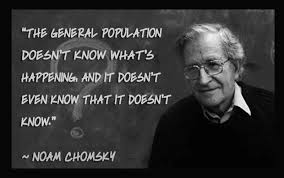
In the following interview Chomsky tells us how things were done by the old time imperialists, people like the Japanese in Korea, and the British in India. These were imperialists that really knew their business not like what he is implying are the incompetent bunch of Neo-Cons then comprising the Bush Administration. He is literally laughing at the current crop because he believes they don’t even know what they HAVE to do! Yet in reviewing these events ranging as far back as his youth Chomsky gets himself lost and confused. The obvious though unstated conclusion is that the U.S. ruling-elite is not behaving rationally. Don’t misunderstand me, the professor would never say this directly. Quite the reverse, but it is nevertheless the only legitimate conclusion that can be drawn from his interview.
Citing various examples he points out that the U.S. in reality has always been opposed to democracy in the Middle East. He points out that they have done so while always proclaiming the opposite rhetorically. Chomsky maintains that after 9/11 the U.S. has not changed policies, and the current talk amounts to the same as it ever was. For Chomsky the Bush administration is as opposed to the spread of bourgeois democracy as have been all other U.S. administrations since WW2!
Meanwhile, Bush maintains there is a new policy.
Chomsky is no longer just arguably wrong, but on the results of the Iraqi elections demonstrably wrong in this crucial example.
Clearly the election in Iraq produced genuine representatives with mass support. What is now devastatingly more the point, is that this process has done so every election cycle since! Yet there has been no change in the election process and no call from anyone for a change! The democratic revolution was a reality, tyranny had been replaced.
These Iraqis politicians are no puppets of U.S. imperialism and to think otherwise is ludicrous. Yet the leading theorists of the moribund left section of the ‘peace movement’ would have us think just that. Their position was then as it is now (all these election cycles later) unsustainable and bereft of a theory of what has emerged in South Africa nor it’s political sibling Iraq.
Chomsky knows the elected representatives are not puppets, so he creates a diversion and argues instead that ‘democracy’ has to mean something other than the establishment of a bourgeois representative democracy. A modern representative democracy with proportional representation is a desirable and supportable advance on the absolute tyranny of the Baathists and he knows that. But instead of accepting this and arguing that the Iraqi masses (just like we in the west) will have to move beyond that level of progress at some point, he fudges this issue of moderate and reasonable negotiated progress.
While anti democratic bombing in Iraq’s markets and schools etc is almost daily still going on in this war between those who are agreeing to a constitutional government and proportional representative bourgeois democracy Chomsky dumps a mish-mash of anarchist ideas on us that effectively concludes that unless they (the representatives) hold the ‘apparent’ views of the masses, (established by secret British polling no less) and demand that the Coalition withdraw forthwith, then the Iraqi political forces are just political elitists no longer representing anyone except themselves! The Ballot barely counted and the newly and in most cases re-elected politicians are to be ignored once more by Chomsky, they being nothing but political elitists!
That is a pathetic slight of hand. The perfect is here put forward to be the enemy of the good.
On top of that distortion Chomsky is not interested in pondering what is in the imperialists interests in the here and now for this century as they planned and implemented this war- a war that was sure to lead to this or a very similar democratic political outcome.
Instead, in what is a deliberate diversion, he tells us that we must never believe declaratory policies, no matter what or who the political leaders are as if we have to take a course in understanding class society 101 from an anarchist viewpoint. But this diversion into the obscure anarchist land of direct democracy is vital a little later when a patently deliberate sleight of hand is pulled.
Chomsky talks endlessly about how he thinks the will of the Iraqi people ‘apparently’ (the word is deliberately used on several occasions) is that the coalition forces should withdraw immediately and leave it to the Iraqi people to sort out. Yet the vast majority of the political forces that stood for election don’t think this and said so during the election campaign.
Thus for Chomsky the ‘apparent’ will of the Iraqi people was not just determined by free and fair elections (that delivered a proportional number of elected representatives of the Iraqi people). Rather the will as Chomsky implies all through this interview is to be determined by a representative poll conducted in secret by the British, and with questions what’s more that we currently do not have clearly before us!
For the decrepit ‘peace movement’ all the election did was enable the imperialists to establish a political elite (leaders and a government) that all good people can now ignore because; ‘No rational person pays the slightest attention to declarations of benign intent on the part of leaders, no matter who they are. And the reason is they’re completely predictable, including the worst monsters,…’
So, those who just ran for election with their platforms and so forth right up front, who are daily risking their lives in the cause of the liberation, can be ignored by Chomsky as speaking for no-one when they again ask the coalition to remain in Iraq and continue assisting to fight the jihadists and Baathists and to build the armed forces etc..
Make no mistake; once ignored, these openly campaigning politicians can then be called collaborators and understandably attacked by the ‘resistance’. Noam and the rest can then shrug with a ‘what do you expect’ exasperated expression. These political leaders will be physically attacked over the years with no solidarity from Z-net types until the attacks in the new Iraq are so blatantly fascist that Noam will have to fall silent.
The concept of a resistance will have to at some point vanish from the narrative.
For anyone remotely attracted to democracy in any form Noam has led them into a dead end.
The violent elements of this ‘noble’ resistance will become ‘the monsters let loose’. A mass non-violent method of resistance led by no-one really – because those leaders would have had to be ignored as well one supposes, will have sprung de novo fully formed and in control of a country fighting undemocratic monsters. Actually you can get away with these leaders (like Chomsky himself) all you do is call them a ‘sort of figure head’ for the mass movement (non violent to be sure). Just don’t look back because there will be no ‘lawful’ trail to follow. A revolutionary transformation will be unavoidably real and will have been fatherless. ‘Not in my name!’ was the banner carried by the confused left and the pseudoleft all marched behind it.
Having plunged this far into Z net thinking we can now see that there is not even a veneer of open inquiry to be found. We are confronted with blatant anti-American shibboleths. There is no ‘seeking truth from facts’ over what has been happening in Iraq.
History was being used by Noam not to guide us forward but to block inquiry into unacceptable areas. It is as if we are in a church service being preached at and not involved in any political analysis. Now we are firmly in the realm of the pseudoleft where theory trumps practice; cultures are fixed and relative; and the ‘struggle against western imperialism’ has regressed to the point where even norms of the basic bourgeois democratic revolution are abandoned before our very eyes.
I have at least one thing in common with Chomsky: I didn’t accept the declaratory policy of the Coalition before, during, or after the war in Iraq*. Nevertheless, I do NOT believe the leaders are ‘completely predictable’ and as evidence for this view I offer the fact that Chomsky admits that he did not predict what they would do once they had overthrown the Baathist tyranny of Saddam Hussein.
Chomsky – as did all the usual suspects – got it dead wrong and he openly admits this. He believed it would be business-as-usual.
Yet a very few dissident left-wingers with a long history of campaigning against imperialism got it right.
For instance, people at Lastsuperpower.net predicted that the US administration, would push for elections that everyone knew islamist parties would win and the Shia would dominate and that this push for democratic elections was in stark contrast to Vietnam where because the democratic result was going to be the election of communists they simply refused to hold them.
In the example of the Vietnam War, left-wingers predicted that U.S. imperialism would be crushed by people’s war and thrown out of Vietnam, and they were. We didn’t apologise for the armed-struggle, we supported it. ‘One side’s right, the other’s wrong; victory to the Vietcong’, was one of the demonstration chants of the time.
No mass non-violent movement threw the imperialist forces out they were defeated by the armed-struggle of the Vietnamese in conjunction with a supportive political struggle on the streets of the Western world. The Vietnamese were engaged in a justifiable armed-struggle just as they engaged the French and Japanese before and leftists around the world supported that armed-struggle!
The current war in Iraq is being waged by Baathists, reactionary Islamic jihadis, and Arab national chauvinists of a mostly Sunni persuasion, but also a very few Shia chauvinists. All are opposed to democracy in any form and can only be described as the enemy of all potential democratic revolutions in Iraq, whether non-violent or armed. They are the enemy of all modernity as the U.S. was in Vietnam and ought be as firmly opposed.
There is thus no comparison between the two wars just as there is no comparison between the war in Vietnam and WW2.
The warring opponents of democracy constitute but a minute [I would now correct this expression to small] portion of the Iraqi population and deserve no support or understanding whatsoever from any descendents of the Enlightenment. They ought be fought by a united-front of all: just like the vicious medievalist Islamists invading from other countries in the region. These Islamists are reactionary, ‘crusader’ types and the irony is not lost on those suffering from their ‘Kamikaze’ and head lopping activities.
The surrounding countries that the Islamists come from are still very deeply mired in the swamp of Middle Eastern reaction, and that ongoing problem is exactly what we ought to be discussing now and not the defense of the Iraqi masses from their vicious attacks.
This is exactly what Noam Chomsky did discuss way back on September 10 2002, and it was raised by Last Superpower author Albert Langer in his article published in 2003 in the mainstream Australian press.
May Day – it’s the festival of the distressed
by Albert Langer
THE AUSTRALIAN 01 May 2003
‘The war in Iraq has woken people everywhere – and the pseudo-Left has really blown its chance’.
Millions who marched in mid February stopped marching two months later, as soon as the argument shifted towards democratising and liberating the Iraqi people. Those millions still agree that George W. Bush is an arrogant bully, but they no longer believe the peace-mongers have got it right. People want to figure out what is going on and are joining the debate at websites such as Last Superpower.
For months, the argument was about weapons of mass destruction and the role of the UN. If the demands of the US, and the UN, had been fully met, Saddam Hussein could have lived happily and the Iraqi people miserably, for ever after.
But look at what happened next! Suddenly we were hearing a different song. Bush has been making the argument not for disarming Iraq but for liberating Iraq. Stripped of the “God bless America” stuff, the US President’s case now goes like this:
“If we devote our resources to draining the swamps, addressing the roots of the ‘campaigns of hatred’, we can not only reduce the threats we face, but also live up to ideals that we profess and that are not beyond reach if we choose to take them seriously.”
Actually, those words are from Noam Chomsky two days before Bush’s UN speech on September 10, 2002.
But if Bush had adopted Chomsky’s position so early, that would have prevented congressional authorisation. Such a position threatens to destabilise despotic, reactionary regimes everywhere. But those in the US foreign policy establishment have devoted their entire careers to supporting the most corrupt tyrannies in the Middle East, in the name of “stability”.
For Chomsky, “draining the swamps” apparently didn’t include killing people and blowing things up. Fortunately, Bush is made of sterner stuff.
Both Bush and Chomsky know the US cannot be secure from medievalist terrorist mosquitoes while the Middle East remains a swamp. But Bush also knows that modernity ‘grows out of the barrel of a gun.’
That is a genuinely Left case for a revolutionary war of liberation such as has occurred in Iraq. The pseudo-Left replies: “That’s illegal.”
Well, of course revolutionary war is illegal. Legal systems are created by revolutions, not revolutions by legal systems.
The next logical step for the new policy is to establish a viable Palestinian state. Bush has put himself in a position where he can and must take that step. Naturally, he will not admit to the enormous strategic and policy retreat that such a step implies, so he has preceded it with enough triumphalist rhetoric to make even the Fox News team look queasy.
The revival of the Left in the ’60s only began once it was widely noticed that the remnants of the previous movement were reactionaries obstructing progress. After it tried so hard to preserve fascism in Iraq even after Bush Jr had wisely given up on Bush Sr’s policy of keeping the Iraqi dictator in power. Can anyone deny the pseudo-Left is reactionary?’
END Albert Langer
As things stand, one could be forgiven for not noticing that a reasonable parliamentary democracy has been agreed upon by the Iraqi masses via a mass vote. The Constitutional Referendum in October does not get a mention – yet it was this document that formally establishes how the Iraqi ‘will’ is to be determined, and replaced the Baathist tyranny. And note to Chomsky it’s not a secret poll conducted by the British military with god knows what wording!
Chomsky goes on at length actually condemning the most democratic election ever held in Iraq and ignoring the proportionally elected representatives. He wants no part of an Iraqi Government because he wants to continue to classify these representatives as collaborators, as does Robert Fisk, whom he praises.
The Iraqi people have gone to the polls three times in twelve months yet their representatives are to be called collaborators and ignored? Something of a card trick; in the end you have been told the will of the Iraqi people so often that ‘apparently’ there is no need to talk to any representatives. In the end you are forced by the card sharp to choose the ‘withdraw at once’ card.
The old-time anti-democratic imperialist practices were the standard practices of the preeminent imperial powers just prior to their crushing defeats. Chomsky is referring to a period so long-ago now that one can speak of a different era.
The US ruling-elite tried the same old policies in Indo-China and met with utter defeat almost 35 years ago. The Vietnamese war of National Liberation is what a war of liberation looks like when imperialists are really trying to prevent elections. But Noam Chomsky insists that the US ruling-elite went into Iraq with no genuine plan to hold free and fair elections.
Could anyone in the year 2006 imagine British imperialists re-colonizing India (And through local Indian puppets to be sure) ruling India for the benefit of the English ruling-class? Could the Japanese elite run Korea via Korean puppets? Of course they couldn’t. Why on earth would anyone think that ‘the great Satan’ could achieve this result in Iraq?
Chomsky then admits to having got it wrong about what the US government intended for Iraq at the time of the invasion. From the transcript;
Andy Clark: “With the war in Iraq, it seems we are viewing the US’s engagement in some bold, in your face, strategic geopolitical chess. In your opinion, what is the US’s next likely international move?”
Noam Chomsky: My own guess frankly, was that the invasion of Iraq would be over in about three days and that the US would install a stable client regime. It should have been one of the easiest military victories in history. But they did turn it into a catastrophe. My guess back at that time was that the next place the US would move would be the Andes in the Western Hemisphere.
End transcript
This is not only admitting that he didn’t have a clue that this was not business-as-usual but that the experienced imperialists didn’t even know how to do the old policy. (That the U.S. had been following since WW2) Chomsky gave example after example of how it is done – and then he says the Bush Administration bungled it.
Unbelievably Chomsky does not concede even the possibility that the U.S. is following a different policy he just blurts out that they blew it and turned what should have been a cake-walk, into a ‘catastrophe!’ This admission comes up, about halfway through the interview after he has gone beyond mere foolishness to ‘explain’ the real reason for the war by no more than chanting the believers mantra; ‘I mean, let’s be serious. Of course it’s oil.’
Naturally there is no analysis of exactly how the imperialists of 2006 are to achieve the long sought mythical holy grail of stealing oil without the old imperialists ability to install puppets.
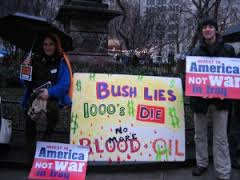
That is what it would have to be, a miracle without rational basis.
Either you have the puppets and you can steal the oil or you don’t have the puppets (As the U.S. elite clearly don’t have) and the oil revenues stay with the Iraqis. It is not done by magic so let’s really be serious because whatever the reason for the war of course it’s not about oil!
From the transcript
Miguel’s email: “Forget about the US and EU governments: they’re hopeless. Where to for ‘the people?’ How can the insanity be stopped? Or will it have to run its course and get much worse before it can get better?”
Andy Clark: What’s your take on that?
Noam Chomsky: The violence in Iraq is a serious problem for the Iraqis and I tend to agree with, apparently the majority of Iraqis, that it’s the occupation forces that are stimulating the violence. The fact that an insurgency even developed in Iraq is astonishing. I mean it’s an amazing fact that the US has had more trouble controlling Iraq than the Germans had in controlling occupied Europe or the Russians in controlling Eastern Europe. After all, the countries under Nazi or Russian occupation were run by domestic forces, domestic police, domestic armies, and domestic civilian forces. The Nazis and the Kremlin were in the background and if needed, they came in, but mostly it was domestically run. There were partisans in Western Europe and they were very courageous, but they would’ve been wiped out very quickly if it hadn’t been for enormous foreign support and, of course, Germany was at war.
Well, in Iraq none of these circumstances prevailed, there was no outside support for the resistance. The little support that has arisen, and it is very slight, is mostly engendered by the invasion. But there’s no outside support. The country had been devastated by sanctions. The US was coming in with enormous resources to rebuild it and they have turned it into a total catastrophe. It’s one of the worst military catastrophes in history. You look at figures for something like, say malnutrition; malnutrition is way up since the US took over, that’s unbelievable. It’s one of the few wars that can’t be reported, not because reporters are cowards, but because it’s too dangerous. Reporters are mostly in the Green Zone or else they go out with a platoon of marines. There are some, like Robert Fisk, Patrick Cockburn and a couple of others who are independent and brave it, but not many. This is an incredible catastrophe. But it’s very likely, and I tend to agree with apparent opinion of most Iraqis on this, that it’s the invading armies themselves that are engendering the violence. Well, they’re carrying out plenty of it, but the violence of the insurgents would probably decline if they left and allowed Iraqis to be on their own.’
End transcript
I read the above two paragraphs, gaping open-mouthed. This war can’t be reported ‘…because it’s too dangerous’! But not for the ‘brave’ partisan anti-coalition reporters – the outright apologists for the insurgents like Robert Fisk, and Patrick Cockburn, who rather than ‘brave it’ are best seen as a protected species of pro-war propagandists. They are not anti-war they are on the other side!
Fisk et al support the right of people’s under imperialist onslaught the theoretical right of resistance; they do not have to condone all the acts, indeed they don’t, after all it’s conveniently a mixed bag of sweets to pick from. As demonstrated these two ‘reporters’ are more properly called propagandists – having argued that the masses of Iraqis viewed the politicians that were elected last January and formed the interim government as nothing more than ‘collaborators’. I predict they will not retract from this position. They will absurdly say this again of the politicians elected in December, yet if they do, who will take them seriously besides Noam Chomsky?
Chomsky now has to face up to the nonsense of calling the once more, free, and fairly elected representatives collaborators. Or it may be time for the anti-war types to dissolve the people and elect a new set, because they keep electing – against all historical examples, one must add – ‘collaborators’.
‘This war can’t be reported?’ Au contraire, it is the most reported war of all time. This war is being fought in the era of instant mass-communications. Bombings and be-headings are often shown live. There are dozens of new and vibrant media outlets in Iraq from TV stations to almost every shade of newspaper. What Chomsky means is that western reporters have to rely more on Iraqi reports.
Then Chomsky stoops to outright deception. He starts out by agreeing that the elections are an important milestone event, then pulls a subtle word switch in order to maintain the ridiculously improbable notion that any democratic outcome was not the U.S. Government’s intention all along.
From the transcript;
Andy Clark:…After the vote, the President has called the elections an important milestone. Professor Chomsky, how do you see the elections? Do you see them as an important milestone for Iraq?
Noam Chomsky: Actually I do, but before talking about that, I should just bring up a kind of a truism. No rational person pays the slightest attention to declarations of benign intent on the part of leaders, no matter who they are. And the reason is they’re completely predictable, including the worst monsters, Stalin, Hitler the rest.’
What he would have us believe is that the U.S. ruling-elite under the leadership of the likes of Paul Wolfowitz were attempting in the 21st Century to;
‘…The US tried, in every possible way, to prevent elections in Iraq. They offered effort after effort to evade the danger of elections. Finally, they were compelled to accept elections by mass non-violent resistance, for which the Ayatollah al Sistani was a kind of a symbol. Mass outpourings of people demanding elections. Finally, Bush and Blair had to agree to elections. The next step is to subvert them and they started immediately. They’re doing it right now. Elections mean you pay some – in a democracy at least – you pay some attention to the will of the population. Well, the crucial question for an invading army is: ‘do they want us to be here?’…
Andy Clark: But isn’t this the start of a process that could see the occupying troops from America and Britain leaving? We’ve seen an awful lot of Iraqis taking part in the elections, two thirds, we’re told. The turnout was quite high…
Noam Chomsky: But hold on a second, … Now of course, there’s a conflict, the Iraqis have forced the occupying powers to allow some kind of electoral process. What the occupying powers are doing now is perfectly clear and very familiar, very familiar. … The way they want it to work – standard procedure – you want the local forces to run their own countries, so … the US-run state terrorist forces are the military, the civilians are local, and the US is in the background. If anything goes wrong, they move in, the same with the British in India, the same with the Japanese in South Korea.
Andy Clark: So you see this is a step to set up a sort of puppet government and not something that’s really representative of ordinary Iraqis?
Noam Chomsky: That’s what they are trying to do, but there’s always a conflict about that. Many of the Western backed or Russian or Eastern or other backed tyrants rose up. However, it is as clear as a bell that the US, and Britain behind it, are doing everything they can to prevent a sovereign, more or less democratic Iraq.’
End transcript
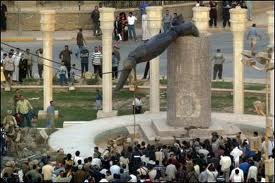
So, Chomsky is saying that the U.S. went into a country with the intention of putting puppets in place, but, presumably, forgot how. Like, they had never done it before??
This is not analysis, this is a pseudo-analysis from a leftist that is now deeply mired in pseudo-leftism and who can no longer tell the real article from the shoddy fraud.
When you get it wrong as he admitted you really ought to pause to think; why did this error of judgment happen? But Chomsky dares not pause to genuinely analyse his errors, instead he rushes on with the explanation that the Bush Administration are just incompetent imperialists. He insists that it was the Neo-Cons that got it wrong by not doing what all competent imperialists do. So, he apparently only got it wrong because they did. SO, it’s not his error at all!
Anything but face up to the policy change that is now being implemented while Chomsky calls black, white. Unlike other analysts, he did not spot it coming before the war and he would not debate the issues when the analysis was pointed out to him, because to Chomsky it was an absurd, unworthy theory. He thought he didn’t have to think about any new issues but now reality is catching up and he is forced to think about the issues.
If the U.S. imperialists did not intend to install puppets after the Baathists were overthrown, and the Iraqi army disbanded then they were left with precisely what options? To honestly pose the question is to answer it.
Contrary to the Chomsky view, the liberating Coalition wanted an election right from the start and they could not possibly not have wanted one in this day and age. The only debate was what type of democratic election. The U.S. elite sought alternatives that empowered the other (Sunni) sections of the Iraqi population to a disproportionate extent, at the expense (necessarily) of the Shia majority. They were told NO, by Sistani who then called for a demonstration of resolve and the matter was thus decided in favour of Proportional Representation. (PR)
Chomsky’s version is a fairy tale. The world would not have tolerated the U.S. preventing Iraqi elections and everybody should have known this. The U.S. ruling-elite most assuredly did.

The only question was what was to be the election regulations etc.. This is why there is deliberate distortion by Chomsky because he understands that if they did not do what he thought they would do and ‘install a stable client regime’, then the outcome would be determined by the Iraqis in an election process.
Now we can ask a question again and this time hope to get a genuine answer based on what the Iraqi people think elections mean.
From the transcript;
Andy Clark: ‘Do you see them as an important milestone for Iraq?
Noam Chomsky: ‘Actually I do’.
End Transcript
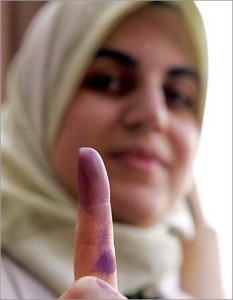
Iraqi woman voter
Actually he does not see them as an important milestone in a genuine sense as to note the milestone properly is to take those elected seriously and to give some honour to those who have enabled their election Chomsky does neither and instead gives contempt and comfort to the enemy.
* The Iraqi election has ended the old war, irrespective of how it started and begun the new war. This war is deserving of support from all democrats, all leftists and all progressives world-wide.
• Results that Chomsky won’t notice.
(Posted at Last Superpower by Patrick Muldowney at 22/01/2006)
Of the 275 seats available from the December 15 election, the results have been announced as follows;
Shi’ites UIA Daawa & SCIRI 128
Shi’ites Risaliyun (Muqtada al-Sadr) 2
(Edited Arthur comment; Not the only 2 seats for Sadr. The party which won 2 seats was a faction of Sadr supporters who didn’t agree with joining in the dominant Shia islamist UIA ticket (Elites and Cadres group or some such “Life of Brian” type name). That dominant Shia ticket included candidates from SCIRI, Daawa, and Sadr supporters as well as others. A total of about 30 Sadr supporters was elected, mainly on the dominant UIA ticket.)
Whether Sadr supporters would have won more or less than the total of about 30 if they had not joined the UIA ticket cannot be determined from the fact that (some faction of them) won only 2 seats running independently. It is however highly likely that the total of 30 allocated in the ticket is a significant overestimation of their actual voting strength as an inducement to abandon their armed insurrection and rely on voting instead by joining the UIA mainstream.
Secular Kurds 53
Secular Shia al-Iraqiyah (Iyad Allawi) 25
Kurds (Sunni Islamist) 5
Sunni NAF 44
Sunni NFforND 11
Sunni, Mishaan Juburi liberal party (ex-Baathists) 3
Turkmen, oppose Shia fundamentalism (at least) 1
Christian, oppose Muslim fundamentalism. 1
Yazidi; oppose Muslim fundamentalism. 1
Mithal al-Alusi, a Western-style liberal 1
These 275 people are self evidently not U.S. puppets. This election result either destroys the theory that it was the intention of the ‘imperialist invaders’ to install puppets (to steal the oil etc., for which there is no evidence despite Chomsky’s ‘explanation’) or it firmly declares at the least that such a theoretical attempt has failed.
Legitimate Iraqi representative politicians are now in charge. This is undoubtedly a bourgeois revolutionary victory over the once all powerful Baathist tyranny. It was achieved in less than three years of struggle, and it has to be said that any other even vaguely realistic hypothetical effort to achieve the same result without a liberating invasion would have cost many more lives, and dragged on over a great many more years. And yes I know the war still goes on, but I am prepared to say right now that the strategic direction is clear. This revolution is going well.
Democratic forces can now hold political power in large areas of Iraq, and while the enemies of the Iraqi ‘peoples with purple stains on their fingers’, can still attack them with random bombings and so on, the Iraqi masses are now well armed and determined to remain on the offensive; and they continue to have very powerful allies.
Yet despite these revolutionary gains, some ‘opinion leaders’ among western political trends are prepared to call these newly elected politicians nothing but ‘collaborators with the occupation, from the point of view of the ordinary Iraqis’. (As Robert Fisk called the same representatives when they were last elected about one year ago) That is essentially what Chomsky and the Z-net types are stuck with. They will have nothing to do with the new reality. They will do their best to deny recognition to these brave politicians. They will fail to give them the due respect and support they have earned as the duly elected representatives. The Z-net types are trapped.
The western anti-war movement will have to split yet again over the issue of where too next. One section will continue to call the evident progress of this revolution ‘a quagmire’, and recommend that the U.S. ruling-elite should ignore the requests for on-going assistance and simply withdraw and leave it to the Iraqis to sort out their ‘civil-war’. Most of the remainder seeing the political dead-end, will just fall silent.
It reminds me of the behaviour of the China-line leftists in the late 1970’s. They went along en masse with the counter revolution of Deng and Co, and the nonsense that was being peddled by various CP (ML’s). When the pretense that this new direction was a continuation of the revolutionary struggle of Mao became unsustainable the people that had been taken in just drifted away. There was not much effort to say ‘I was wrong’. The actual result was rejection of the political tendency that had been proven correct, as well as that tendency which had led them into a dead end.
The current ‘peace’ campaigners; greens; liberals; conservatives; and ‘leftists’, will be objectively behaving as outright racists if they refuse assistance to the Iraqi People now. None of these tendencies belly-ached about their own government’s offering police and other military assistance to authorities in other countries such as Spain when they were dealing with mass-murdering bombers, or with the authorities in Bali; or London; or New York and so forth. Why would they reject the appeals of the Iraqi political leadership for assistance now?
Consider what a national unity government means.
“The UIA and the Kurds could form a government but in this period we have no interest in doing this and are leaning more towards a national unity government,” says Hoshyar Zebari, Iraq’s foreign minister.
As we saw with the negotiations over the Iraq Constitution; and the three months of negotiations to form the interim government elected last January this latest series of negotiations will go on for quite some time, and no doubt some seemingly peculiar compromise solutions will be worked out.
However, even though numerous issues have already been worked through with the formation of the interim government a year ago it is always possible that we could be surprised, and also that longer rather than shorter, negotiations are to be expected. In the end however, I don’t doubt that a national unity government will be formed even if some of the smaller political forces decide to remain outside of it.
These historic negotiations are intended to establish a country that has never before existed. A country where the majority of the population is no longer ruled by an ethnically privileged 20%. That 20% has some adjusting to do and they are not in a strong negotiating position. Those who can’t make enough of an adjustment will remain at war with the vast majority, but that is up to them, because I would be willing to wager that an inclusive democracy with ample power sharing; religious tolerance; and economic guarantees regarding proportional shares of the country’s oil wealth is on offer.
It would not make sense for the 80% to fail to protect the proportional interests of the 20%, because there is really nothing in it for them, as compared to the advantages of ‘living the good life’ in a rapidly developing peaceful and united Iraq.
Just as the U.S. could never steal the oil resources and did not go to war for oil, neither does it make any sense for the Kurds, and the Shia to try and take down the Arab Sunni people’s from their rightful share of the growing wealth. It is far easier to keep making a larger pie to share, than to fight over crumbs from a much smaller static pie. Peace will bring an enormous economic opportunity.
Insurgents will not improve their negotiating position with more time, and their opponents are definitely not going to send the large military ally home while those groups remain at war. Until such a time as the new Iraqi armed forces are massively more powerful than the insurgents, about the best that the ‘nationalist’ insurgency can face save for, (because this war really is lost) is a plan for a method to establish a time-table for the occupation troops to go home, or some such gobbledygook wording, because they will not be given a firm time-table. All this is on offer now so I would guess that most will grab it with both hands.
What ‘guarantees’ are to be given in terms of stopping military actions against both the government and Coalition forces and providing protection to economic assets as a result of inclusion in the government are the big issues. How is delivery of the guarantees to be measured? Cease-fires have to show up statistically. Areas have to go quiet, casualties have to fall, and discipline has to be enforced by the locals first.
The Government sending the Coalition home only arises in the context of having substantially built up the national armed-forces, and demonstrable demobilization of the insurgency. The Government must become far more powerful. These are hard-nosed negotiators requiring more than just promises of future peaceful behavior. There will have to be measured steps, on both sides, as the fighting reduces but inevitably goes on. This messy latter stage part of draining the Iraqi swamp can only be run by the locals.
The first of the steps, required of those entering the political process is the total isolation of the Al Qaeda type Jihadis, this is the bottom line starting point to the new negotiations.
The nationalist insurgents are now clearly drawn into politics, and thus separated from and fighting against these ‘enemies of all’. The huge bulk of the elected politicians will be obliged as evidence of their sincerity to publicly denounce the latter types as ‘enemies of all Iraqis’, and to make reasonable efforts to stand-down the former nationalist insurgents that have an honorable peace process before them. All are obliged into giving due allegiance to the national armed-forces and police-force, in due deference to not just majority rule but a substantially consensus rule.
Incidentally, the vote this time seems to me to be a good base for a rise in the secular vote in four years time as a big growth in young voters continues and more people drift away from religious style political representation under the influence of a vibrant mass-media as now exists in Iraq. If secularist politicians perform well they have every reason to be optimistic. After all, Iraqi politics has now opened up and progressives not only have a place at the table, but an electorate to win. They have space, time and enough people so could need little else to make good progress with this revolution.
But to get a flavour of what the anti-war luminaries make of the same developments see Juan Cole; Bay Area Indymedia
For a more up to date picture of Iraqi politics “The Security Council reiterates that no terrorist act can reverse the path towards peace, democracy and reconstruction in Iraq, which is supported by the people and the Government of Iraq, and by the international community.” See here for more UN Security Council statements on current situation faced in Iraq






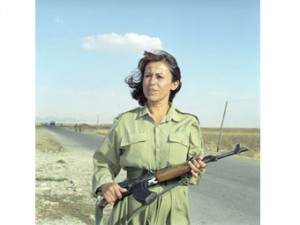
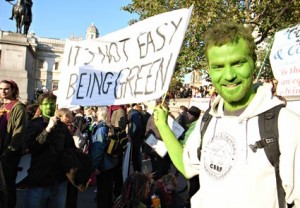
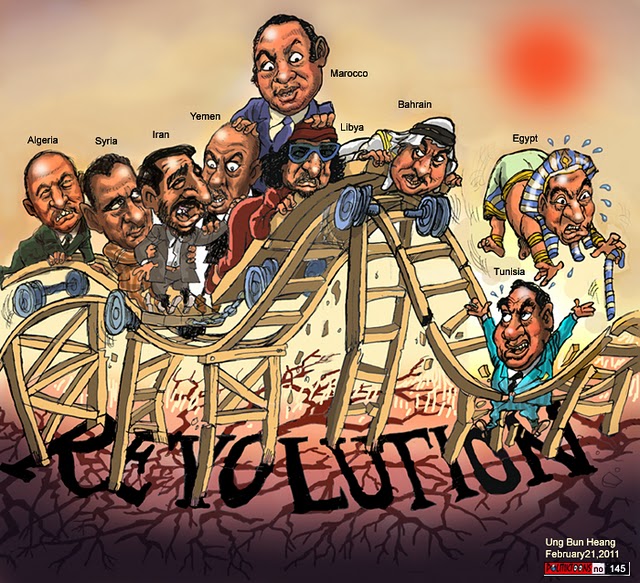
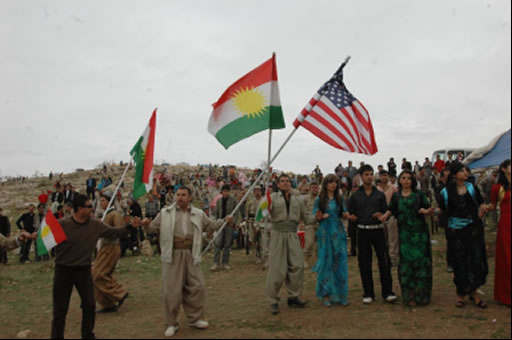
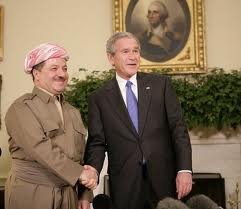
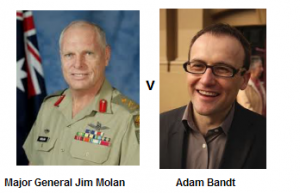

Recent Comments